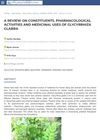Phytochemistry, Pharmacological Activity, And Potential Health Benefits Of Glycyrrhiza Glabra
June 2021
in “
Heliyon
”
TLDR Licorice has many health benefits but should be used carefully due to possible side effects.
The review on Glycyrrhiza glabra, or licorice, highlighted its diverse phytochemical constituents and pharmacological activities, noting compounds like glycyrrhizin for their anti-cancer, anti-inflammatory, and antimicrobial effects. Licorice was recognized for stimulating hair growth, showing better results than 2% minoxidil in treating alopecia. It also provided benefits such as controlling obesity, hepatoprotection, and memory enhancement. The review compiled data from 144 articles, emphasizing traditional uses and potential side effects. Licorice exhibited anticoagulant, antimalarial, and antispasmodic activities, and showed promise in managing diabetes, dyslipidemia, and various cancers. Despite its therapeutic potential, the review cautioned about possible toxicological effects and the need for controlled use and further research.





